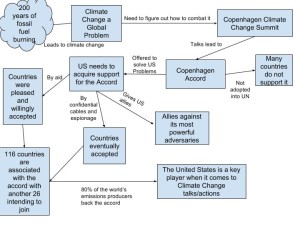Burning fossil fuels started 200 years ago. Once this started, the world was burning more than they could regenerate. This led to a substantial amount of greenhouse gases being released into the atmosphere. Climate change is a major problem affecting the entire planet. In order to adapt to this problem and combat it, the world must unite to form a plan of action. As a way to unite and discuss this issue, the Copenhagen Climate Change Summit was held in 2009. The result of the summit was an unofficial document known as the Copenhagen Accord. This document was not adopted into the UN process, so it was irrelevant to many countries. The accord offered to solve US problems, such as finding an easier way than the UN process to bind in rapidly growing countries. Negotiating a climate treaty is no small process, it involves the re-arrangement of the flow of billions of dollars to reduce global carbon. In order to reap the benefits of the accord, the United States needed to get as many countries as possible to back it. They accomplished this by sending financial aid to some nations and by using espionage on other more powerful nations. They were able to gain supporters both ways which led them to receiving allies against some of its most powerful adversaries. As a result, 116 countries are currently associated with the Accord and there are another 26 with intent to join. These countries produce 80% of the world’s emissions. The United States now has the upper hand when it comes to combating global warming.
I personally believe that climate change mitigation is a collective action problem. In order to adapt to this changing climate, we need to find a middle ground and work together. No matter what country burned the most fossil fuels, every single person on this planet is affected by our choices. Even though it is a collective action problem, the larger countries who produce the most greenhouse gases should pay or contribute more to solve this problem. A small island nation with environment friendly attributes should not have to be burdened with solving this problem as much as heavy polluters like the United States and China. It would be difficult for the richer nations because they would have to reduce emissions by reducing industrial production which leads to less money for the nation and its citizens. Nobody wants to make less money. We can also help reduce greenhouse gases ourselves. Individual action also comes into play. One person may not seem like they will make a difference, but there are many people who are similar in their lifestyles. There is a large percent of the American population that live in automobile suburbs. If everyone carpooled to work or school, that would cut emissions greatly. I do not believe the State Department cables should have been leaked to the public because it will make climate change negotiations much more difficult. I feel as if countries will not trust the United States and make things worse off than when the talks began. The United States should not have been so shady in conducting their deals. They should have been open with other nations and gain trust the respectable way. There should have been no espionage or bribes. The United States should find a common ground with the UN. The countries supporting the accord should merge with those supporting the UN’s protocol. There should be a plan that every country agrees with. This would be a very hard task but extremely beneficial for the world.


Hi Anthony, my name is Katie. I found your paragraphs and diagram very interesting. Your labels on your arrows made your diagram very easy to follow. I also agree that climate change is a collective action problem and that individuals, and individual countries need to find a way to come together to help prevent worsening the problem. Here is a link to my post if you are interested: http://sites.psu.edu/geog30/2016/04/06/module-9-climate…ange-katie-kurtz/